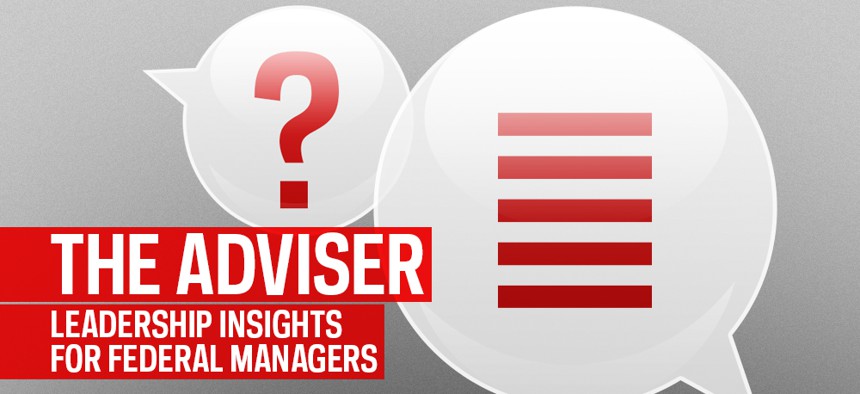
4 Ways to Improve Accountability in Your Office
Leaders who take personal responsibility build a culture of commitment.
Q: I am trying to figure out how to address accountability in my office. In the Culture Climate Survey, staff identified accountability of leadership as an issue. In the past, leaders either avoided problems or tried to address them after they became far too serious. This is a very sensitive issue because when leaders are held accountable, it is often done in private. Every now and then, often when it is too late, a leader is transferred to another office or agency. How do we assure our staff that their leaders are being held accountable beyond posting office values on the walls and without exposing the details of what’s being done?—Anonymous
Thank you for emailing me your question! Accountability is in the news for many reasons. From low scores in the Climate Culture Survey to the resignation of Veterans Affairs Department Secretary Eric Shinseki, accountability is a hot topic in Washington. In this age of austerity, “accountability” (or the lack thereof) is the word most commonly used when something has gone poorly.
Organizationally, troops on the front line commonly are held accountable, often in a way in which their colleagues know about it. But are leaders held accountable? Sometimes actions like the resignation of Shinseki are high profile and easily observed. But in other instances, measures taken in the name of accountability are behind closed doors or not seen by the troops. How can the troops know that leaders are being held accountable instead of being let off the hook?
Accountability has two components. One involves blame. When something goes wrong, the public, politicians, leaders and managers want to hold someone accountable by punishing the guilty. In other words, accountability occurs after the fact.
The other component of accountability involves responsibility, leadership and engagement. It is an attitude that people adopt because they believe what they do creates value for others, and therefore they take responsibility for organizational outcomes. They perceive that leaders support their efforts by helping them remove barriers impeding the mission. People also perceive that they have reasonable influence over the evaluation of their work and that the rewards and consequences are fair. In such an environment people choose to be accountable.
If accountability, especially for senior management, is viewed as an issue in your office then what can you do improve it? Here are four suggestions:
- Formulate the real problem. I suspect accountability concerns represent an indicator or symptom of a bigger issue or set of issues. Calls for accountability are like canaries in a coal mine. They are indicators of a pervasive problem, such as lousy leadership, a corrupt culture or organizational pathologies. It would be quite rare for an organization to score highly on all dimensions of the Culture Climate Survey except for accountability. From your question, it sounds like you may have stepped into a role that involved some leadership problems in the past and you are trying to turn the workforce’s expectations around. Dig into the organization’s history so you understand the path it took to arrive at its current state.
- Demonstrate your credible commitment to a leadership approach that differs from the past. A credible commitment is one in which you put something valuable, like your reputation, on the line. If you want people to engage and accept personal responsibility then you must do the same in a public way. You must take responsibility for what your team has done poorly or a project that has not gone well. When you take full responsibility, you can then investigate why things happened and work with your team to take steps to make sure the situation does not happen again. Of course, if good things have happened you want to celebrate the team and give employees full credit to demonstrate how you are supporting them.
- Set clear expectations for individuals and the organization. If expectations are understood across the organization, then it becomes easier for people to be accountable. Such broad understanding puts their reputation at stake. All too often, leaders incorrectly assume people know what they should be doing. Even if people know what they should be doing, changing demands, short-term pressures and firefighting can cause individuals and groups to quickly lose focus and drift. Set expectations and keep everyone focused.
- If employees consistently fail to deliver and accept accountability, help them find a situation in which they can commit. That may mean changing responsibilities in their current job, and other times it may mean helping them seek out opportunities in other organizations. In proposing the latter, do so respectfully and consistently, irrespective of a person’s position.
A workforce that chooses to be accountable likely will respond favorably to climate culture surveys.
Duce a mente
(May you lead by thinking)







